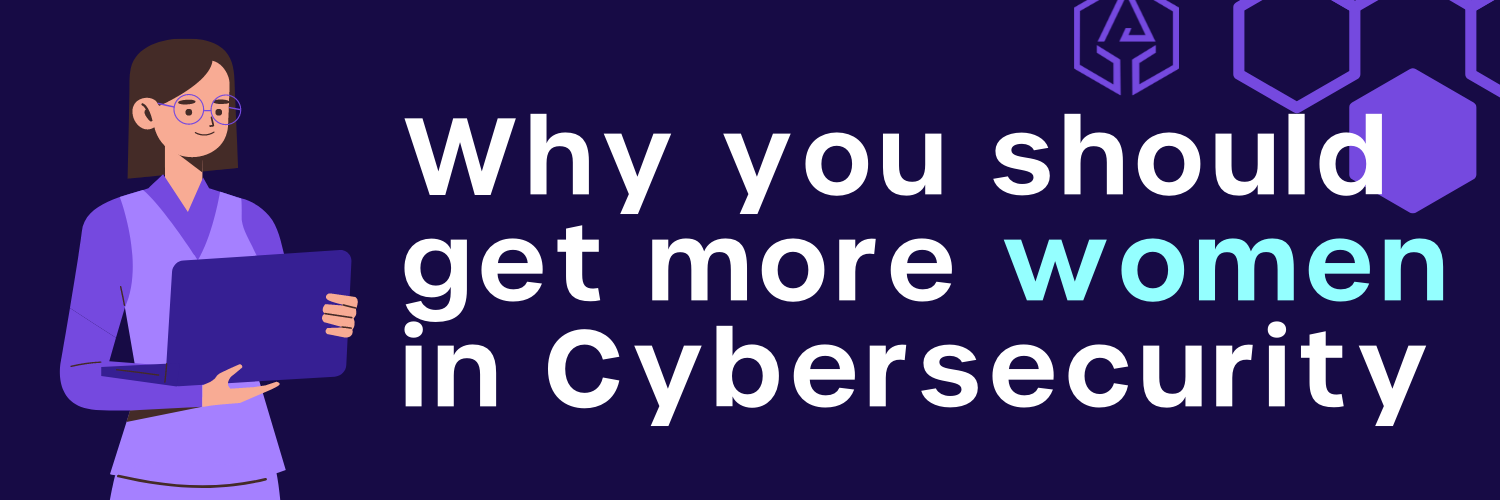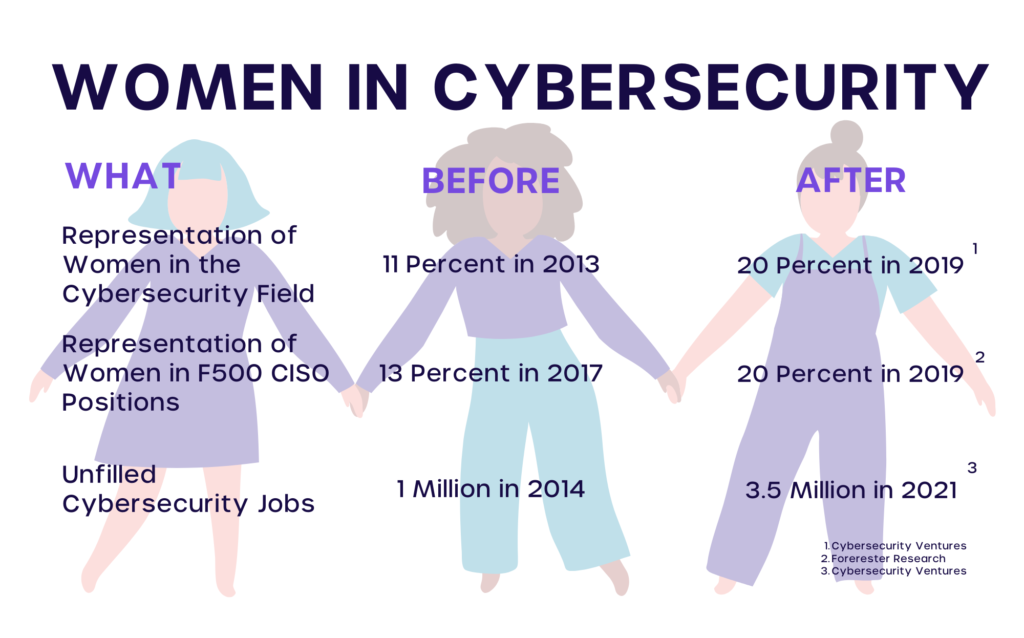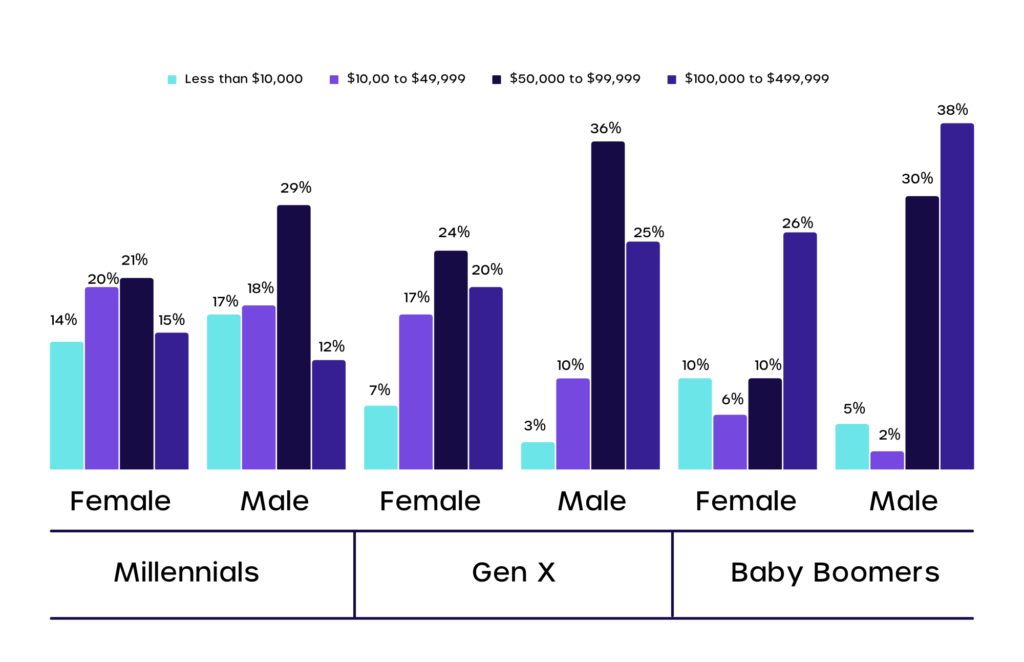Why we need more women in cybersecurity

Why we need more women in cybersecurity
Cyvatar | 03/08/2022Women in cybersecurity
Did you know that the InfoSec Institute has estimated that there is currently a worldwide shortage of nearly three million when it comes to staffing in the cybersecurity industry?
On the other end of the spectrum, Cybercrime Magazine reports that cybercrime will have an economic impact of close to 6 trillion dollars by 2021-22. This in itself should show the vast need for the industry to expand and get qualified women into cybersecurity.
So why are there fewer women in cybersecurity?
The lack of female cybersecurity security experts wasn’t as bad as it was in 2011.
Back then, only 11% of the workforce was represented by female cybersecurity experts.
There has been a rise in the number of women working in cybersecurity, with 24% of the workforce made up of women, in recent years.

That said, let’s look at the main reasons why we have fewer female cybersecurity experts:
- The negative outlook of cybersecurity among women
- Women and their preferences in STEM courses
- Underrepresentation of women in the field of cybersecurity
Negative Outlook for Women
Before we talk about education, we need to understand the perception of the cybersecurity industry as a whole to know why there is a lack of women in the cybersecurity industry.
For one, young women sometimes perceive cybersecurity as a profession that requires women to be far more successful than men to be treated equally.
Even some female students have concluded that technical jobs are better suited to guys.
Another reason could be how cybersecurity is usually shown in pop culture in general.
People tend to imagine cybersecurity professionals as hooded figures craned into their systems in a dark room, battling it out like they are in a war room kind of scenario.
While this perception could seem vaguely true in the field of ethical hacking, it’s quite far from the truth.
Plus, some of the jargon used within the industry, like cyberattacks, gives the impression of a very stressful and aggressive environment, which could contribute to the reason why we don’t have more cyber ladies representing organizations.
The above perceptions are all the result of a survey conducted by NBC and The Hechinger Report where they asked teenagers about what they thought about career prospects in the industry.
Women and STEM Courses
One thing we need to understand is that it’s not just the cybersecurity industry that’s being overtaken by men. Most STEM professions still suffer from a lack of women in their ranks, even after decades of equal gender rights initiatives.
STEM-related subjects, which include science, technology, engineering, and math, appear to be less popular with young women.
Many parts of the country still think that men are better at math and science, even though women often do as well as or better than them on tests.
Underrepresentation of Women in Cybersecurity
The current labor pool for the cybersecurity industry and STEM-related jobs as a whole is predominantly male. This makes it harder for women to get into high-profile jobs within the industry, even with the stereotype breaking slowly.
The fact that cybersecurity is a mostly male field can be a huge deterrent for women.
The other issue that women could face is being underpaid or underrecognized in the workplace. As the industry itself is male-dominated, it cannot be reversed overnight. That said, it’s for employers to make sure they meet the workforce gender balance.
According to a 2017 ISC2 report, 51% of women in cybersecurity said that they had been discriminated against.
So, even when attempting to get into the cybersecurity industry, there is a high chance of women facing some form of discrimination. So the change needs to come from the organizations’ and hiring managers’ sides to see some progress.
Importance of women in the cybersecurity
As we know now, the cybersecurity industry reports a lack of about 3 million in terms of staffing and that it is a male-dominated industry. With only 24% of the entire workforce represented by women, there are also reports of a severe shortage of talent.
It’s believed that 53% of organizations have reported a shortage in cybersecurity skills. And this does not pertain to just cybersecurity firms, but most organizations, as some form of cybersecurity is a necessity.
Coincidentally, a report by ISC2 on Women in Cybersecurity details that women in the cybersecurity field tend to be more educated than their male counterparts and have the potential to reach higher positions.
Hence, the answer is simple, isn’t it? Hire more women cybersecurity professionals.
That said, there is pay inequity across women of different ages.

Getting more women into cybersecurity help:
- Build a gender balance in the infosec industry
- Bring in different perspectives to combat various threats
- Break ground and change the status quo
- With growth and learning opportunities
1. Gender Balance in the Cybersecurity Industry
There is a drastic need for talent currently in the cybersecurity industry. With many women typically having higher education and skillsets in the industry than men, eradicating the stigma of a male-dominated STEM job industry is critical.
“The representation of women in cybersecurity has made positive developments over the last ten years, but we still have a lot of work to do, as females only make up 25% of the industry’s workforce.
– Aileen Casmano, Director of Marketing, Cyvatar.ai Inc
As more women break into cyber companies and roles, and forge a successful career path, it will inspire our younger generation of females to pursue degrees and careers in cybersecurity, laying a progressive foundation for the future. Employers must prioritize making cybersecurity a welcoming and gender-inclusive space for everyone.”
Gender equality will only bring in more talent and fill the workforce, which can only be a good thing.
2. A Different Perspective
Getting women into the cybersecurity industry can also help bring more diversity to a cybersecurity team. As diversity provides benefits to most industries, it can do the same in the cybersecurity industry.
Threats, hackers, and cybercriminals can come from different backgrounds and walks of life and have vast backgrounds and experiences.
So how do you combat or track them? Can bringing more diversity into the workforce help gain different perspectives to bolster cybersecurity? Definitely, yes!
3. Breaking Ground and Changing the Status Quo
The terms “techie,” “ethical hacker,” or “cybersecurity whiz” are mostly attuned to the male demographic. This is a perception built into society over time.
Close the gender gap, and you can change this status quo and break the stereotype that cybersecurity is a field for men.
With the change in perception, people will think that women are better at cybersecurity than men are, which will encourage more young women to study STEM during their schooling.
4. Growth and Learning Opportunities
Women in cybersecurity are believed to be more educated than males. A statistic that reflects this is that 44 percent of men in cybersecurity have a postgraduate degree, compared to 52 percent of women.
Furthermore, women in the field are more likely to advance to positions of leadership. This demonstrates that gender diversity provides chances for growth and learning.
The recruitment of highly qualified and ambitious women helps the workforce and business thrive as a whole.
There is a lot of room for gender diversity (and hopefully other types of diversity) in the cybersecurity field. Closing this gap will help.
How can women get into cybersecurity?
There should be no doubt by now that there is a huge gender gap in the cybersecurity field.
While it may take some time and effort for organizations to restructure and rebalance their workforce, there are a lot of initiatives all over the world that aim to specifically help women get into the workforce and have a bright career.
Here are just a few examples of initiatives that help women in the field of cybersecurity:
- WiCys (Women in Cybersecurity) (Global)
WiCys is a non-profit membership organization whose mission is to bring together women in cybersecurity to exchange experience and information, as well as to provide mentorship and networking opportunities.
How do you become a WiCys member anyway?
You can join WiCys by subscribing to any of their annual plans. The yearly membership price is $20 for students, $55 for academic members and government or nonprofit personnel, and $95 for industry members. Attendance at the yearly WiCys conference costs extra ($40–$850).
- Women’s society of cyberjutsu (WSC) (USA)
WSC was established in 2012 and now serves thousands of women worldwide. It focuses on women’s cybersecurity professions by offering training, networking, and mentorship.
How can you join the WSC?
WSC membership rates begin at $50 for military personnel and students and rise all the way to $100 for other women.
- WoSEC: Women of cybersecurity (Global)
This group is concerned with the social aspects of cybersecurity for women. It has a sizable Twitter following and Meetup groups in several US cities, as well as Canada, France, Switzerland, India, Kenya, and other places.
How to get involved with WoSEC?
WoSEC charges no membership fees. A list of chapters, as well as links to the various Meetup groups, may be found at the conclusion of this Code Like a Girl blog article. You can also use the Meetup website to search for “WoSEC” to see if there is a group in your area.
How can women become cybersecurity experts?
If you have decided to take upon the challenge and be a part of this ever-increasing industry, here are a few pointers to keep in mind:
- Find a female mentor
Having a mentor with experience in cybersecurity helps answer your questions and elevates your enthusiasm. She can guide you by listening to your goals and objectives, which will help you along your career path.
- Commit to learning
Cybersecurity is an ever-changing industry, and there is always something new to learn every day. If you want to get into the cybersecurity industry, get started with an online course, get any library book, or just Google. Whatever you have to do, just stay up to date on the latest cybersecurity news.
- Failure is an opportunity to learn better
Failure is inevitable and is a part of the process. Don’t restrict yourself from trying new things. Your first job doesn’t have to be a “perfect job.” Don’t shy away from any opportunity. There are a variety of strategies to achieve personal success, and they are presented in a variety of ways. Believe in yourself and your abilities, and don’t be afraid to share your thoughts — this is how you will grow the most.
| Help us close the gender gap in cybersecurity. Cyvatar is hiring! See all of our open positions. Carpe diem, women! |
